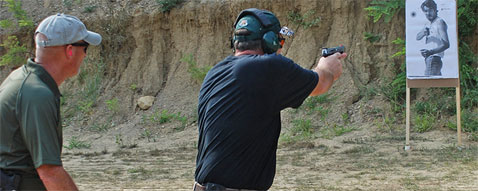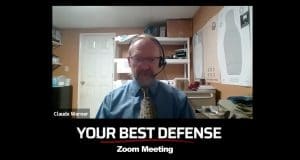
It’s fashionable these days to refer to a gunfight as a “critical incident” or a “crisis point” but I don’t think such phraseology tells the whole story. A crisis is defined as “an emotionally stressful event or situation involving an impending, abrupt and decisive change. Throughout our lives we will all face any number of crisis events, but not all crises turn out bad…some change us for the good. A crisis can involve an event like a natural disaster or a situation like a car crash or hazardous spill, both of which require some type of action but these events or situations do not involve a clash between human adversaries which is what is known as conflict, an irreconcilable clash between opposing wills, a situation involving an adversary opposing the will of another…a fight. While a conflict is certainly a crisis, not all crises involve conflict and I think this needs to be understood when discussing the subject.
I have nothing against anyone who wants to teach the use of firearms… I applaud those that take the time and effort to become an instructor, but I have been criticized…trashed, actually… for my belief that an instructor who has faced conflict will teach combative firearms “better” than an instructor that has not. While I use the word “better” it is not the quality of the instruction I am referring to as anyone who has good presentation skills can teach concepts, lessons, documented information, tactics and techniques. What I am referring to is having a better understanding of what is being taught and its application under stress and duress. For example, most everyone who teaches combative skills knows the human body goes through what is known as “fight or flight” or “body alarm reaction” during conflict. This physical and psychological phenomenon is usually described by its symptoms (tunnel vision, loss of digital dexterity, auditory exclusion, slow motion, etc.) and an instructor worth a salt will inform their students of its existence, but do they really understand it enough to truly prepare their student for what it will do to them? Fight or flight is a result of threat information being transmitted to the Hypothalamus that in turn sends a signal to the Pituitary Gland creating a “chemical cocktail” of epinephrine, cortisol and norepinephrine that travels through the body creating some pretty dramatic changes to the body. I can honestly say that I did not totally comprehend it until I went through it. Now I have true empathy for the phenomenon that an instructor who has never experienced it just can’t have. I believe this experience allows me to explain what will happen to them “better” than someone who has not.
Seems reasonable, right? So who is so vocal in their opposition to my suggestion? Instructors who want to be considered experts in the field of armed combat but have never faced real danger, usually due the path they have taken in life. I had one such person tell me “I thought about a career in law enforcement but decided there was no money in it and the military? Forget it!” I have no problem with a person who wants to pursue higher wages or a better position; however, when it comes time for me to draw on my experience(s) don’t act like you are an equal in the field because you have taken some classes. Does this lack of street or field experience make them bad instructors? Of course not! But, no matter how much they want it to be to the contrary, experience counts! Dispute it is you must, but reality is just that…reality! A person who has faced physical danger willingly possesses a level of personal knowledge that someone who has merely taken a training course or read a book cannot comprehend. You see, most anyone can share what they have been told, but only those who have faced a life threatening situation can share it in the first person…re-telling someone’s war story is not the same.
Another example is how one deals with the fear that WILL accompany such a situation. Fear is a natural occurring phenomenon and it is truly your friend…something not understood by those who have not been there. I once attended a training course taught by an instructor who told the students “ignore your fear and just drive on” which told me instantly he had never experienced true, life threatening fear…the kind of fear that makes you want to shut down. Those who have actually faced conflict know you don’t ignore fear, you embrace it! You see, courage is not the absence of fear, its one’s ability to control it, use it to your advantage and take action in spite of it. You see, once action is taken fear slips away and those who have experienced conflict and fear resolution understand this.





Dave- We are products of the same generation and worked the street at a time where acceptable standards for everything were different. I have a degree of understanding and experience that places me at the upper end of your curve. It is not something I am proud of. It simply is what it is and I hope all of those days are behind me.
I could not agree with you more. If I could only add one more thought to your well written article, it would be about the other aspect found in every encounter. Accountability.
This accounts for the differences between a law abiding officer (or citizen)showing a reluctance to fight.
Your point about the amount of experience
(previous shootings) recorded in the study by the felons is a call to review your mindset for training and life.
For other industry ‘so called professionals’ to trash talk your point of view is something you don’t need to defend. Hopefully your readers and students (particularly those who serve) will take this lesson to heart.
Nice work.
Just a quick note. Thanks so much Dave for ALL articles. Thanks. – Hock
While experience has its place in instruction, that assumes that the ‘experience’ was worthwhile to impart to others. In other words, did the person survive and thrive because they were good and did things correctly or was due to poor dumb luck? There’s a lot more of the latter out there than people like to admit.
For instance, let’s take the ‘experience’ of Officer G in this LAPD incident. Unless he’s done significant remediation, his experience is not what I plan to model my performance on.
Sorry, I am going to make you read through the whole report because I think the context of his performance in relation to the other officers involved is important.
http://www.lapdonline.org/assets/pdf/022-05%20Public%20BOPC%20Summary.pdf
Analogy ahead…
I have given birth to five children. By itself, that does not qualify me to be an obstetrician.
The obstetrician who delivered my youngest child had never been pregnant in his life, and never would. But he still made a quite comfortable living teaching people how to give birth and then helping them do it.